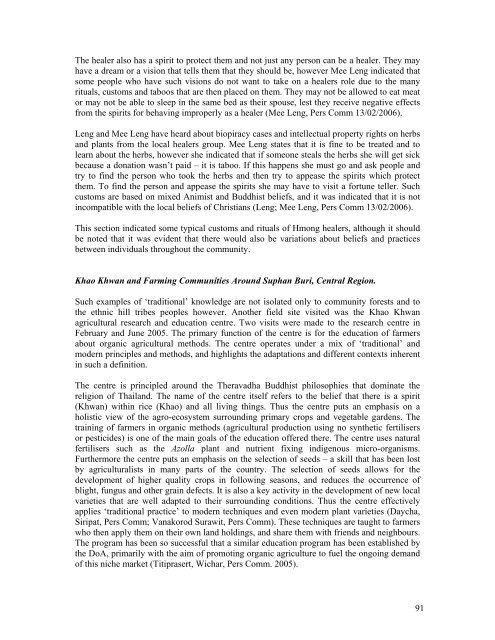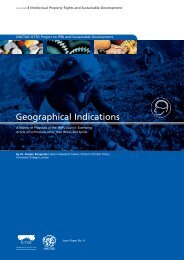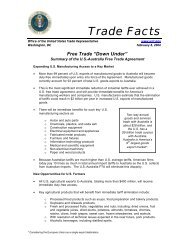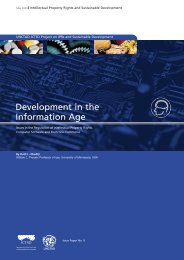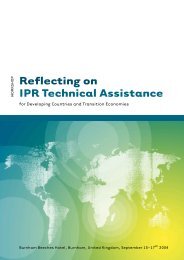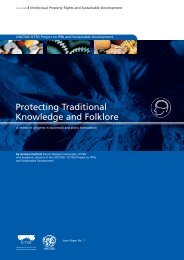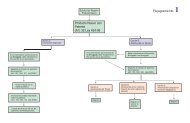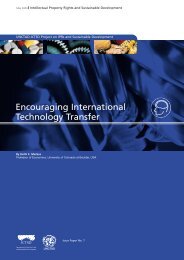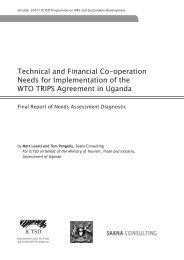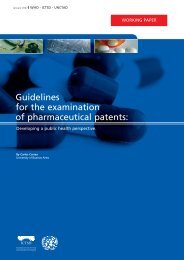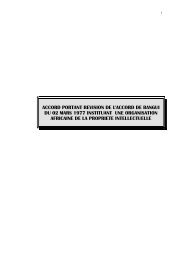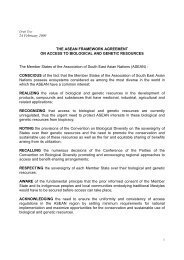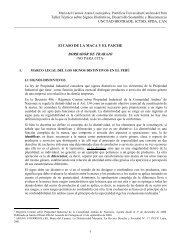Governance and Micropolitics of Traditional ... - IPRsonline.org
Governance and Micropolitics of Traditional ... - IPRsonline.org
Governance and Micropolitics of Traditional ... - IPRsonline.org
Create successful ePaper yourself
Turn your PDF publications into a flip-book with our unique Google optimized e-Paper software.
The healer also has a spirit to protect them <strong>and</strong> not just any person can be a healer. They may<br />
have a dream or a vision that tells them that they should be, however Mee Leng indicated that<br />
some people who have such visions do not want to take on a healers role due to the many<br />
rituals, customs <strong>and</strong> taboos that are then placed on them. They may not be allowed to eat meat<br />
or may not be able to sleep in the same bed as their spouse, lest they receive negative effects<br />
from the spirits for behaving improperly as a healer (Mee Leng, Pers Comm 13/02/2006).<br />
Leng <strong>and</strong> Mee Leng have heard about biopiracy cases <strong>and</strong> intellectual property rights on herbs<br />
<strong>and</strong> plants from the local healers group. Mee Leng states that it is fine to be treated <strong>and</strong> to<br />
learn about the herbs, however she indicated that if someone steals the herbs she will get sick<br />
because a donation wasn’t paid – it is taboo. If this happens she must go <strong>and</strong> ask people <strong>and</strong><br />
try to find the person who took the herbs <strong>and</strong> then try to appease the spirits which protect<br />
them. To find the person <strong>and</strong> appease the spirits she may have to visit a fortune teller. Such<br />
customs are based on mixed Animist <strong>and</strong> Buddhist beliefs, <strong>and</strong> it was indicated that it is not<br />
incompatible with the local beliefs <strong>of</strong> Christians (Leng; Mee Leng, Pers Comm 13/02/2006).<br />
This section indicated some typical customs <strong>and</strong> rituals <strong>of</strong> Hmong healers, although it should<br />
be noted that it was evident that there would also be variations about beliefs <strong>and</strong> practices<br />
between individuals throughout the community.<br />
Khao Khwan <strong>and</strong> Farming Communities Around Suphan Buri, Central Region.<br />
Such examples <strong>of</strong> ‘traditional’ knowledge are not isolated only to community forests <strong>and</strong> to<br />
the ethnic hill tribes peoples however. Another field site visited was the Khao Khwan<br />
agricultural research <strong>and</strong> education centre. Two visits were made to the research centre in<br />
February <strong>and</strong> June 2005. The primary function <strong>of</strong> the centre is for the education <strong>of</strong> farmers<br />
about <strong>org</strong>anic agricultural methods. The centre operates under a mix <strong>of</strong> ‘traditional’ <strong>and</strong><br />
modern principles <strong>and</strong> methods, <strong>and</strong> highlights the adaptations <strong>and</strong> different contexts inherent<br />
in such a definition.<br />
The centre is principled around the Theravadha Buddhist philosophies that dominate the<br />
religion <strong>of</strong> Thail<strong>and</strong>. The name <strong>of</strong> the centre itself refers to the belief that there is a spirit<br />
(Khwan) within rice (Khao) <strong>and</strong> all living things. Thus the centre puts an emphasis on a<br />
holistic view <strong>of</strong> the agro-ecosystem surrounding primary crops <strong>and</strong> vegetable gardens. The<br />
training <strong>of</strong> farmers in <strong>org</strong>anic methods (agricultural production using no synthetic fertilisers<br />
or pesticides) is one <strong>of</strong> the main goals <strong>of</strong> the education <strong>of</strong>fered there. The centre uses natural<br />
fertilisers such as the Azolla plant <strong>and</strong> nutrient fixing indigenous micro-<strong>org</strong>anisms.<br />
Furthermore the centre puts an emphasis on the selection <strong>of</strong> seeds – a skill that has been lost<br />
by agriculturalists in many parts <strong>of</strong> the country. The selection <strong>of</strong> seeds allows for the<br />
development <strong>of</strong> higher quality crops in following seasons, <strong>and</strong> reduces the occurrence <strong>of</strong><br />
blight, fungus <strong>and</strong> other grain defects. It is also a key activity in the development <strong>of</strong> new local<br />
varieties that are well adapted to their surrounding conditions. Thus the centre effectively<br />
applies ‘traditional practice’ to modern techniques <strong>and</strong> even modern plant varieties (Daycha,<br />
Siripat, Pers Comm; Vanakorod Surawit, Pers Comm). These techniques are taught to farmers<br />
who then apply them on their own l<strong>and</strong> holdings, <strong>and</strong> share them with friends <strong>and</strong> neighbours.<br />
The program has been so successful that a similar education program has been established by<br />
the DoA, primarily with the aim <strong>of</strong> promoting <strong>org</strong>anic agriculture to fuel the ongoing dem<strong>and</strong><br />
<strong>of</strong> this niche market (Titiprasert, Wichar, Pers Comm. 2005).<br />
91


